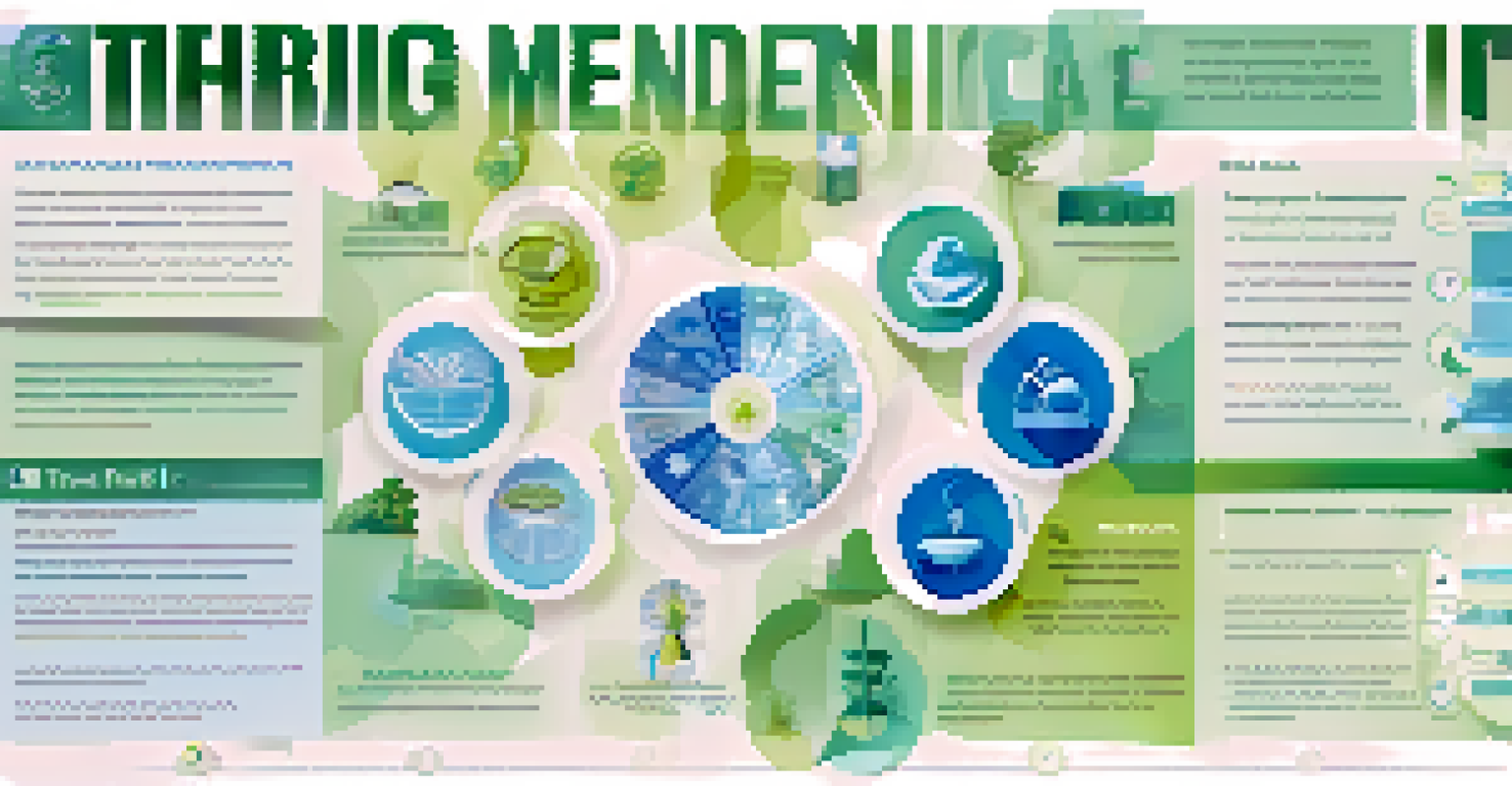Challenges in Regenerative Medicine: Ethics and Regulations

Understanding Regenerative Medicine and Its Promise
Regenerative medicine holds the promise of repairing or replacing damaged tissues and organs, enabling the body to heal itself. This innovative field encompasses a range of techniques, including stem cell therapy, tissue engineering, and gene therapy. As exciting as it is, the potential of regenerative medicine also brings forth a host of ethical and regulatory challenges that must be addressed.
The greatest discovery of my generation is that a human being can alter his life by altering his attitude.
For instance, the idea of using stem cells, particularly those derived from embryos, raises significant moral questions. Many people have strong beliefs about the beginning of life and the appropriate use of human cells. Consequently, these concerns necessitate a careful examination of the ethical implications surrounding regenerative therapies.
Furthermore, the regulatory landscape is complex and varies significantly by region. In the U.S., the Food and Drug Administration (FDA) oversees the approval of these therapies, ensuring they are safe and effective. However, the pace of innovation often outstrips regulatory frameworks, creating a gap that can hinder progress.
Ethical Dilemmas in Stem Cell Research
One of the most contentious ethical dilemmas in regenerative medicine arises from stem cell research. The source of stem cells is a major point of debate, particularly when it comes to embryonic stem cells. Many advocate for their use due to their pluripotentiality, meaning they can develop into any cell type. However, opponents argue that this practice disrespects potential life, leading to a moral impasse.

Additionally, the use of adult stem cells presents its own set of ethical challenges. While they are less controversial, the limitations in their ability to differentiate into various cell types can restrict research and therapeutic options. This raises questions about how to balance ethical considerations with the pursuit of scientific advancement.
Ethical Challenges in Regenerative Medicine
Regenerative medicine faces significant ethical dilemmas, particularly regarding stem cell research and the source of cells used.
These dilemmas not only fuel public discourse but also influence funding and policy decisions. As researchers seek to navigate these murky waters, they must often engage with ethics boards and public opinion to ensure their work aligns with societal values.
Regulatory Hurdles for Innovative Therapies
The rapid pace of innovation in regenerative medicine often clashes with existing regulatory structures. Agencies like the FDA are tasked with ensuring safety and efficacy, but these standards can be slow to adapt to new technologies. For example, the approval process for novel therapies can take years, delaying access for patients who could benefit from these advancements.
Science knows no country, because knowledge belongs to humanity, and is the torch which illuminates the world.
Moreover, the complexity of regenerative treatments can lead to confusion over which regulatory pathway to follow. Is a therapy a drug, a biological product, or a device? This ambiguity can complicate the approval process, leading to uncertainty for researchers and companies alike. Many are left navigating a maze of regulations that may not be tailored for their specific innovations.
As a result, some researchers may opt for less rigorous pathways, which can further complicate the landscape. Striking a balance between safety and innovation remains a significant challenge.
Informed Consent and Patient Autonomy
Informed consent is a cornerstone of medical ethics, particularly in the context of regenerative medicine. Patients must fully understand the potential risks and benefits of experimental therapies before participating in clinical trials. However, the complexity of these treatments can make it difficult for patients to grasp what they are consenting to, potentially undermining their autonomy.
Moreover, the rapid advancements in the field often lead to changes in protocols that may not be adequately communicated to participants. This dynamic nature of research raises concerns about whether patients are truly informed at every stage of their treatment journey. Ensuring that patients are equipped to make informed decisions is a critical ethical imperative.
Regulatory Hurdles for Therapies
The rapid pace of innovation in regenerative medicine often clashes with slow-moving regulatory frameworks, complicating the approval process.
To address these challenges, researchers and institutions must prioritize clear communication and transparency. Developing educational materials that simplify complex concepts can empower patients and enhance the informed consent process.
Equity and Access in Regenerative Medicine
As with many advanced medical treatments, there is a risk that regenerative medicine may exacerbate existing health inequities. If access to innovative therapies is limited to those who can afford them, vulnerable populations could be left behind. This raises ethical concerns about equity and justice in healthcare.
Moreover, disparities in access to clinical trials can affect the diversity of research participants. A lack of representation can lead to therapies that are not effective for all populations. Addressing these disparities requires a concerted effort from researchers, healthcare organizations, and policymakers to ensure that all patients have equal access to cutting-edge treatments.
Creating frameworks that prioritize inclusivity and accessibility will be vital for the future of regenerative medicine. This not only fosters ethical responsibility but also enhances the robustness of research outcomes.
The Role of Public Perception in Regulation
Public perception plays a crucial role in shaping the regulatory landscape for regenerative medicine. As societal attitudes shift, so too does the regulatory environment. For example, increased public support for stem cell research can lead to more favorable policies, while ethical concerns can prompt stricter regulations.
Moreover, misinformation can skew public understanding of regenerative therapies, leading to fear and resistance. Clear, accurate communication from scientists, healthcare professionals, and regulators is essential to foster a well-informed public. Engaging with communities to address concerns and misconceptions can bridge the gap between science and public sentiment.
Ensuring Access and Equity
There is a risk that advanced regenerative treatments may exacerbate health inequities, limiting access for vulnerable populations.
Ultimately, a well-informed public can drive positive change, encouraging regulatory bodies to adapt and evolve in response to societal values and needs.
Future Directions: Balancing Ethics and Innovation
Looking ahead, the challenge for regenerative medicine will be finding a balance between ethical considerations and the pursuit of innovation. As technology advances, we must remain vigilant in addressing the ethical dilemmas that arise. Continuous dialogue among scientists, ethicists, policymakers, and the public will be essential to navigate these complexities.
Moreover, adapting regulatory frameworks to accommodate new developments can help ensure that safety is not compromised in the name of progress. Collaboration between regulatory agencies and researchers can lead to more streamlined approval processes while maintaining rigorous safety standards.

Ultimately, the goal is to create a sustainable ecosystem where ethical considerations guide innovation, allowing regenerative medicine to flourish while respecting societal values.